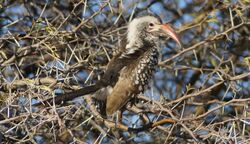Biology:Damara red-billed hornbill
| Damara red-billed hornbill | |
|---|---|

| |
| File:Tockus damarensis - Damara Red-billed Hornbill XC290180.mp3 | |
| Scientific classification | |
| Domain: | Eukaryota |
| Kingdom: | Animalia |
| Phylum: | Chordata |
| Class: | Aves |
| Order: | Bucerotiformes |
| Family: | Bucerotidae |
| Genus: | Tockus |
| Species: | T. damarensis
|
| Binomial name | |
| Tockus damarensis (Shelley, 1888)
| |
The Damara red-billed hornbill (Tockus damarensis) is a species of hornbill in the family Bucerotidae. It is found in southwest Angola and northern Namibia. All five red-billed hornbills were formerly considered conspecific.
Description
thumb|left|In Kunene Region, Namibia Damara red-billed hornbills are small species of African hornbills. They have curved dark to bright red bills with their nostrils on the upper beak close to their eyes. Their heads are covered in greyish-white feathers with dark grey feathers running along the back of their heads and upper half of the neck. Like all red-billed hornbills, Damara red-billed hornbills have wings covered in circles of white feathers surrounded by black or dark brown feathers. Their tail feathers are black on the exterior and white on the interior and their legs are short and grey with small semi-sharp claws at the end. Their bellies are usually greyish white but can also be pure white.
Distribution
Damara red-billed hornbills can be found in southwestern Angola and northern Namibia. They can be found nesting or resting in local trees in grasslands or savannahs.
References
- ↑ BirdLife International (2016). "Tockus damarensis". IUCN Red List of Threatened Species 2016: e.T22725940A94906853. doi:10.2305/IUCN.UK.2016-3.RLTS.T22725940A94906853.en. https://www.iucnredlist.org/species/22725940/94906853. Retrieved 7 September 2023.
- Kemp, A.C. and W. Delport. 2002. Comments on the status of subspecies in the red-billed hornbill (Tockus erythrorhynchus) complex (Aves: Bucerotidae), with the description of a new taxon endemic to Tanzania. Annals of the Transvaal Museum 39: 1–8.
- Delport, W., A.C. Kemp, and J.W.H. Ferguson. 2004. Structure of an African Red-billed Hornbill (Tockus erythrorhynchus rufirostris and T. e. damarensis) hybrid zone as revealed by morphology, behavior, and breeding biology. Auk 121: 565–586.
Wikidata ☰ Q2933619 entry
 |


